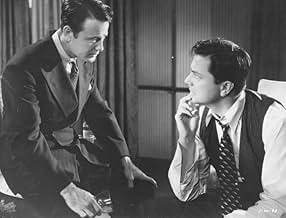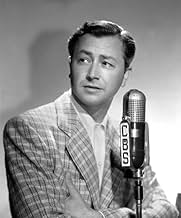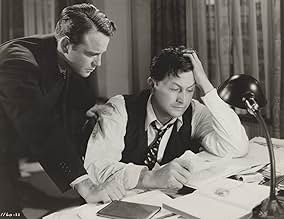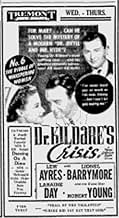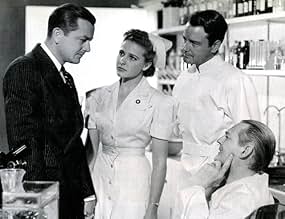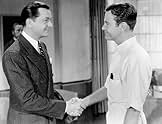Adicionar um enredo no seu idiomaNurse Mary Lamont is excited about her brother's impending visit. The young man's strange behavior puzzles Dr. Kildare who believes he may be hiding a serious illness.Nurse Mary Lamont is excited about her brother's impending visit. The young man's strange behavior puzzles Dr. Kildare who believes he may be hiding a serious illness.Nurse Mary Lamont is excited about her brother's impending visit. The young man's strange behavior puzzles Dr. Kildare who believes he may be hiding a serious illness.
- Direção
- Roteiristas
- Artistas
- Foghorn Murphy
- (as Horace MacMahon)
- Clifford Genet - Window Cleaner
- (não creditado)
- Assistant Bed Salesman
- (não creditado)
- Mr. Stubbins - Man with Pain
- (não creditado)
- Maisie - Emergency Switchboard Operator
- (não creditado)
- Doctor
- (não creditado)
Avaliações em destaque
Lew Ayres does a solid job. Laraine Day gets a lot to work with this time and makes the most of it. Robert Young is good as the brother. The best scenes, not surprisingly, involve Lionel Barrymore's Dr. Gillespie. The scene where he talks about his late brother or when he goes through old love letters and sings "Seeing Nellie Home" are fine showcases of how a talented actor like Barrymore could own a film with a few moments here and there. Last appearance in the series of Bobs Watson as Tommy, a crippled boy recovering with the help of Dr. Gillespie. This little subplot is an example of the fine continuity that helped make this series so exceptional. I have similar praise for MGM's other great series with Andy Hardy. So much to like about this one. I can't imagine a fan of the series not enjoying it. But I suppose that depends on how sensitive you are to a movie made three-quarters of a century ago having outdated medical information.
Robert Young playing Laraine Day's brother arrives at Blair General Hospital exhibiting some strange behavior and something of a new attitude toward life. He sounds like a motivational speaker from today as he wants to pitch an idea about training schools for people not learning any trades because of the Great Depression.
Given some of the symptoms Ayres suspects epilepsy and for some strange reason doesn't want to confide in Day which puts one great strain on the relationship. It ain't nearing and endearing him to Young either, but Ayres wants to be sure.
Kildare films usually go one of two ways either Kildare makes a right diagnosis and Lionel Barrymore as Dr. Gillespie backs him up, or he's on the wrong track and Barrymore has to set him straight. If you watch the film, you'll find out which it is.
Dr. Kildare's Crisis was one of his own making, he should have sent Young to a specialist post haste. But that would be how it was done in the real world.
A subpar Kildare film from MGM.
Kildare and Mary are planning their wedding when Douglas comes to visit. He has a plan to help unskilled labor become skilled, and needs the support of one of Kildare's grateful ex-patients.
Unfortunately it's downhill from there, due to a very weak script. Kildare, without examining Mary's brother, decides he has epilepsy on the basis that Douglas sometimes seems to hear noises no one else hears.
This makes Mary afraid to marry Kildare for fear of having him end up with a sick wife or epileptic children. She becomes hysterical and wants to return home with her brother.
Well, this plot line is so pathetic that the New York Medical Society wrote a letter in protest about the way epilepsy is treated in the film - that it's curable, that it can be inherited, and that it can lead to insanity.
Also, how could Mary, a trained nurse, go so crazy and insist on dumping Kildare, whom she's been chasing for years? Really preposterous behavior on the part of the characters. The audience knows them by now and it's pretty bewildering.
The series would be over in 1942 and become the "Dr. Gillespie" series, which retained Barrymore and Alma Kruger. Lew Ayres was persona non grata for being a conscientious objector in World War II, though he did work on the front lines as a medic. MGM didn't care, they just wanted to be rid of him.
When he returned from the war, the handsome Ayres did some of his best work, receiving an Oscar nomination for "Johnny Belinda," and continuing his career until 1994.
Laraine Day, though MGM never seemed to know what to do with her,(happily, she was loaned out a lot) is lovely as Mary, and of course, due to her involvement with Kildare, Mary becomes a casualty in this series.
Dr. Gillespie, starring in his own movie series, would mellow. Both the Kildare and Gillespie series were very popular. It's a shame that this film seems so out of place.
I found this series entry to be worth viewing. Another reviewer made some valid points about the weakness of some character motivations, but I still can see why Mary could react the way she does when discovering the truth, which Jimmy Kildare has kept from her.
Robert Young turns in an excellent performance as Mary's brother, proving how versatile an actor he was. He wasn't always the boring and stable father from Father Knows Best (and later on becoming the Dr. Welby mentioned above).
We learn a bit more about Dr. Gillespie's past; he had a brother who died. We also learn a bit more about how and why he feels special towards Molly Byrd.
Overall, another entry worth watching and enjoying.
I must admit that these negatives, however, do not mean that "Dr. Kildare's Crisis" is not an uninteresting film. Indeed, it's so well acted by the leads that it's apparent they were ready for headier stuff, acting-wise. Laraine Day is so impressive as Nurse Mary Lamont that it's a wonder MGM didn't build a better career for her during her studio contract. She's not only extremely attractive but does a decent job in a role that's not particularly well conceived.
Robert Young does nicely with some starkly dramatic moments, proving that this MGM series was a good training ground for their young contract players. No surprise that better roles would lie ahead for Ayres and Young. Miss Day would have to wait until she left the studio for better assignments.
Lionel Barrymore is his usual grumpy and sometimes obnoxious self as Dr. Gillespie, using all of his well-known mannerisms and then some.
But for a drama dealing with medical terms and hospital life, the epilepsy angle is badly handled and factually incorrect both as to treatment and diagnosis.
Summing up: As it is, this is formula stuff--some romance, some light moments and then some darker elements before the windup with Ayres emerging as a heroic doctor.
Você sabia?
- CuriosidadesThe Medical Society of New York wrote a letter to the PCA protesting the way epilepsy was presented in the movie. They objected to the claims that epilepsy is inherited, that it is curable and that it leads to insanity.
- Erros de gravaçãoWhen Dr Gillispie finishes reading the note from Mary, he says "Fine girl, that Mary" and puts the note on his desk with a thump, and with the next cut, it immediately appears in Dr. Kildare's hands.
- Citações
Douglas 'Doug' Lamont: [on a prescribed treatment plan] Suppose I decide it isn't worth it?
Dr. James 'Jimmy' Kildare: Well, then you face a gradual disintegration of the brain, probable insanity, and a wretched living death.
- ConexõesFollowed by Minha Vida É Tua (1941)
Principais escolhas
Detalhes
- Data de lançamento
- País de origem
- Idioma
- Também conhecido como
- O Dilema do Dr. Kildare
- Locações de filme
- Empresa de produção
- Consulte mais créditos da empresa na IMDbPro
- Tempo de duração
- 1 h 15 min(75 min)
- Cor
- Proporção
- 1.37 : 1

